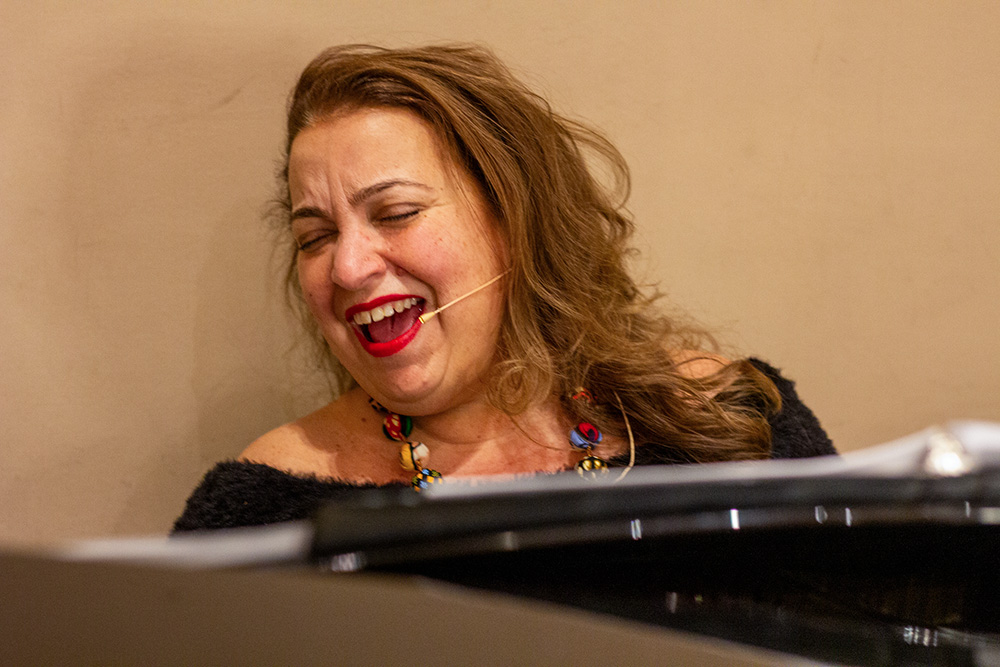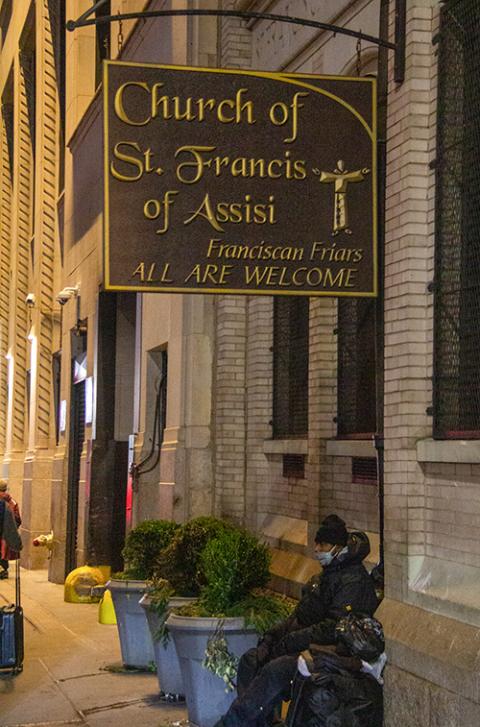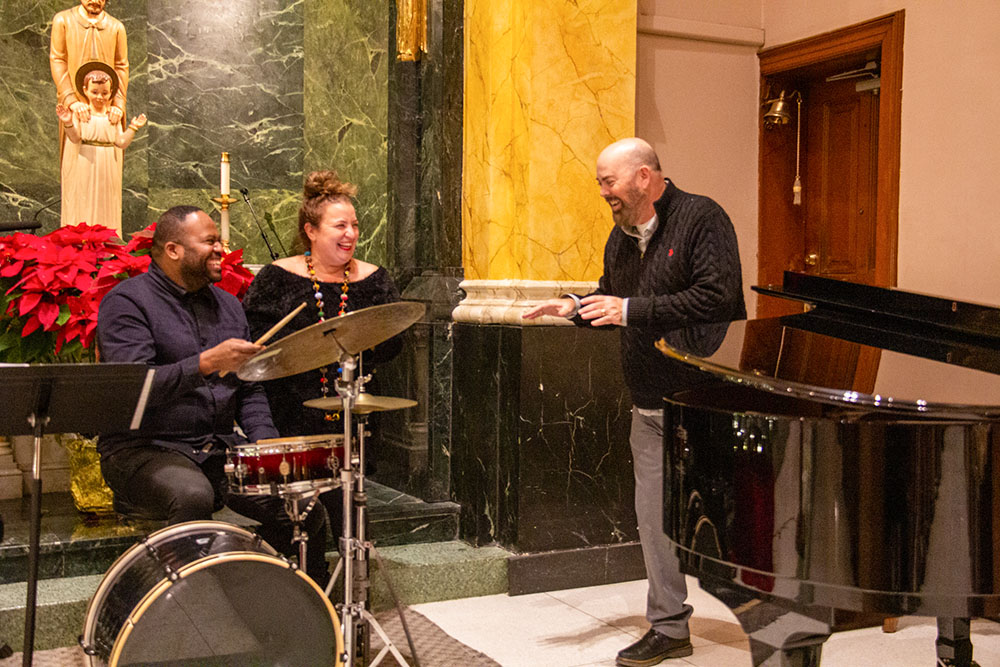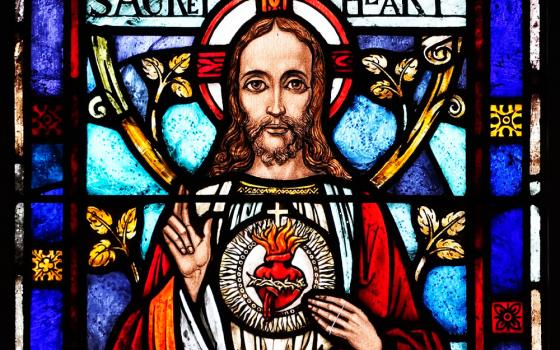
The New York City-based Catholic musician Meredith Augustin will perform several liturgies, lead the Taizé Prayer and sing at a workshop at the 2025 Los Angeles Religious Education Congress. (Karen Lindell)
Half a block from Penn Station in New York City, St. Francis of Assisi Catholic Church is filled with people, but dark and silent. Until a woman's a cappella voice, warm and resonant, suddenly pierces the stillness, "Thula ... thula ... thula ..."
"It's a Zulu word that means 'Be still,' 'Be quiet,' " explains Meredith Augustin, who led the cry of "thula" that evening at last year's Easter Vigil. "It calls everybody to attention, and points people to prayer."
Augustin, the music director at St. Francis of Assisi, both exhorts and lulls listeners with open arms. As a musician and parish leader, she embraces the words on a sign outside the Manhattan church run by Franciscan friars: "All are welcome."
This week, she will bring this ethos to the annual Los Angeles Religious Education Congress. During the Feb. 20-23 congress, Augustin will perform in several liturgies, lead the Taizé Prayer and sing at a workshop on "New and Engaging Music for Liturgy."
Augustin won't be singing merely to impress listeners. "There are a million fine musicians, but Meredith is different because performance is not her primary focus; it's the people she serves," said Mary Prete, former manager of World Library Publications, a sacred-music company.

Meredith Augustin is the music director at St. Francis of Assisi Catholic Church in Manhattan, New York. As a musician and parish leader, she embraces the words on the sign outside the church run by Franciscan friars: "All are welcome." (Karen Lindell)
Augustin has carved out a way to shine in the Catholic Church, which has not always welcomed lay women as leaders. Performing and overseeing music is one of the roles in which they have been able to significantly influence liturgy.
Such participation in Catholic music goes back centuries, said Margot Fassler, professor emerita of music history and liturgy at the University of Notre Dame. Throughout the Middle Ages, she said, "women monastics had major control over the music of their monasteries." They commissioned and composed liturgical music, and taught singing in their communities.
Today, lay Catholic women serve as music directors, choral conductors, instrumentalists and cantors. Augustin takes on all those roles at St. Francis, plus others that underscore her commitment to service. She directs the church's LGBT Ministry; teaches the importance of liturgical inclusion; and as a single mom to two teenagers, offers workshops about the "ministry of motherhood" and self-care. Augustin also serves as vice president of pastoral services at Renew International, a nonprofit that helps parishes build small Christian communities.
Her spirit of caring and inclusion infuses the repertoire she selects — music that invites members of the congregation to join in, often in a language, style or rhythm that is familiar or easy for them to sing. The Easter vigil, for instance, begins with four drummers playing djembe, conga and shakers as a priest proclaims, "Out of darkness, God brings us light."
Franciscan Fr. Jerome Massimino, a former pastor at St. Francis, said he hired Augustin in 2007 because although the church's music program at the time was "high-quality," it also was "High Church," favoring classical choral repertoire.
"I didn't want people to sit back and listen to a choir or cantor perform motets and hymns," Massimino said. "I wanted people to sing with them."
The church's Sunday evening service, he said, featuring Augustin on piano accompanied by a bass player and drummer, went from half the church being filled to standing-room only.
Parishioner Irene Venditti said the church "has always been blessed to have good singers" as cantors and choir members. But Augustin "gets everybody else to sing."
Advertisement
Still, Augustin is aware that not all Catholics welcome contemporary music — that's why she learned to play the organ when she came to St. Francis. Some are outright hostile toward contemporary music. She once received a piece of hate mail that said, "This is not a cabaret, and the primary instrument of the church is the organ," she recalled.
What kind of music Catholics should sing (and the instruments they hear) has been a longstanding controversy in the church.
In the wake of the 1962-65 Second Vatican Council, which led to musical changes in liturgy, organ music dropped out in many churches, and folk music featuring guitars and percussion became popular. The pendulum has swung back, however, to organ and choral music favored by younger generations of Catholics who are more conservative.
A Vatican II document, Sacrosanctum Concilium (Constitution on the Sacred Liturgy), makes clear that whatever type of music is played, singing by the assembly is key: "Full and active participation by all the people is the aim to be considered before all else; for it is the primary and indispensable source from which the faithful are to derive the true Christian spirit."
That principle guides Augustin, who's also an expert on liturgy, said John Flaherty, chairperson of the liturgy committee and music director for the LA Religious Education Congress, where he has worked with Augustin for more than 20 years planning liturgies and music.
"It's one thing to be a musician in the church," he said. "It's another to be a musician like Meredith who knows the ritual of the church, and can shape the music to the ritual, not just play songs during Mass."

Meredith Augustin rehearses with Manny Laine and William Mulligan at St. Francis of Assisi in Manhattan, N.Y. (Karen Lindell)
In 2007, a document released by the U.S. Conference of Catholic Bishops, "Sing to the Lord: Music in Divine Worship," added another consideration, emphasizing that the liturgy should reflect a congregation's cultural diversity.
Jennifer Kluge, executive director of the National Association of Pastoral Musicians, said that Augustin, a member of the group, has been a "key voice" reminding the association of the importance of "making sure there is a place at the table for everyone."
At this year's LA Congress, Augustin, who has a passion for Haiti and its language, will proclaim the intercessions in Haitian/Creole at a liturgy for Catholics of African descent. She fell in love with the Caribbean nation's culture after seeing the Broadway musical "Once on This Island," set in Haiti. "I felt like the music was part of my soul," she said.
For the 2016 LA Congress, Augustin composed the theme song, an upbeat, percussive piece titled "Misericordia Inagotable," or "Boundless Mercy." "I wanted to bring something from New York to LA, so I brought salsa," she said. "I live in a city full of rhythms."
Augustin grew up in West Virginia and has been singing since age 2. She was involved in church choirs and musical theater from grade school through college at Wheeling University, a private Jesuit institution in West Virginia. Outside of church, she sang a wide variety of genres, such as jazz and disco, in bands.
After graduating with a degree in psychology, she earned a master's in rehabilitation counseling. Her journey from counselor to Catholic music director was not a 180-degree switch. "I like the whole idea of healing," said Augustin, who moved to New York in 1996. "Now, I use music as a tool for healing."
Augustin also sings and records in the secular world. She has released two albums, and performs at small venues. Her favorite music to perform is jazz.
"Jazz is communication," she said. "It's all about listening and responding."
Another key service role for Augustin is ministering to LGBTQ Catholics at St. Francis. Fr. James Martin, editor at large for the Jesuit magazine America, and founder of Outreach, an LGBTQ Catholic support community, invited Augustin to plan a liturgy for an Outreach conference.
"By providing a warm, welcoming, inviting liturgical space, she helps LGBTQ people feel at home," he said in an email. "But she also ... offers a welcoming space in her heart."
Augustin often repeats a phrase made popular by pride supporters: "Love is love."
Thula. Be still ... and love.








